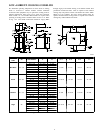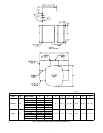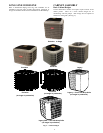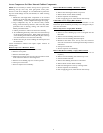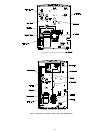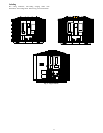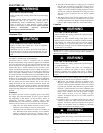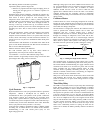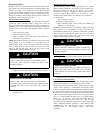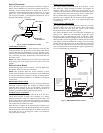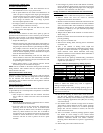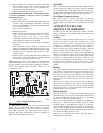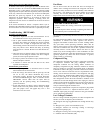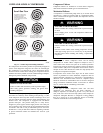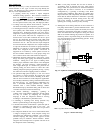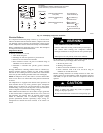
14
Pressure Switches
Pressure switches are protective devices wired into control circuit
(low voltage). They shut off compressor if abnormally high or low
pressures are present in the refrigeration circuit. Puron pressure
switches are specifically designed to operate with Puronr systems.
R--22 pressure switches must not be used as replacements for the
Puronr air conditioner or heat pump. Puronr pressure switches are
identified by a pink stripe down each wire.
Low--Pressure Switch (AC
Only)
The low--pressure switch is located on suction line and protects
against low suction pressures caused by such events as loss of
charge, low airflow across indoor coil, dirty filters, etc. It opens on
a pressure drop at about 50 psig for Puron and about 27 for R22. If
system pressure is above this, switch should be closed. To check
switch:
1. Turn off all power to unit.
2. Disconnect leads on switch.
3. Apply ohmmeter leads across switch. You should have
continuity on a good switch.
NOTE: Because these switches are attached to refrigeration system
under pressure, it is not advisable to remove this device for
troubleshooting unless you are reasonably certain that a problem
exists. If switch must be removed, remove and recover all system
charge so that pressure gages read 0 psi. Never open system
without breaking vacuum with dry nitrogen.
PERSONAL INJURY HAZARD
Failure to follow this caution may result in personal injury.
Wear safety glasses, protective clothing, and gloves when
handling refrigerant.
CAUTION
!
To replace switch:
1. Apply heat with torch to solder joint and remove switch.
PERSONAL INJURY HAZARD
Failure to follow this caution may result in personal injury.
Wear safety glasses when using torch. Have quenching cloth
available. Oil vapor in line may ignite when switch is
removed.
CAUTION
!
2. Braze in 1/4--in. flare fitting and screw on replacement
pressure switch.
High--Pressure Switch (AC &
HP)
The high--pressure switch is located in liquid line and protects
against excessive condenser coil pressure. It opens around 610 or
670 psig for Puron and 400 psig for R22 (+/-- 10 for both).
Switches close at 298 (+/-- 20) psig for R--22 and 420 or 470 (+/--
25) psig for Puron. High pressure may be caused by a dirty
condenser coil, failed fan motor, or condenser air re--circulation.
To check switch:
1. Turn off all power to unit.
2. Disconnect leads on switch.
3. Apply ohmmeter leads across switch. You should have
continuity on a good switch.
NOTE: Because these switches are attached to refrigeration system
under pressure, it is not advisable to remove this device for
troubleshooting unless you are reasonably certain that a problem
exists. If switch must be removed, remove and recover all system
charge so that pressure gauges read 0 psi. Never open system
without breaking vacuum with dry nitrogen.
PERSONAL INJURY HAZARD
Failure to follow this caution may result in personal injury.
Wear safety glasses, protective clothing, and gloves when
handling refrigerant.
CAUTION
!
To replace switch:
1. Apply heat with torch to solder joint and remove switch.
PERSONAL INJURY HAZARD
Failure to follow this caution may result in personal injury.
Wear safety glasses when using torch. Have quenching
cloth available. Oil vapor in line may ignite when switch is
removed.
CAUTION
!
2. Braze in 1/4--in. flare fitting and replace pressure switch.
Loss of Charge Switch (HP
Only)
Located on liquid line of heat pump only, the liquid line pressure
switch functions similar to conventional low--pressure switch.
Because heat pumps experience very low suction pressures during
normal system operation, a conventional low--pressure switch
cannot be installed on suction line. This switch is installed in liquid
line instead and acts as loss--of--charge protector. The liquid--line is
the low side of the system in heating mode. It operates identically
to low--pressure switch except it opens at 23 (+/-- 5) psig for Puron
and 7 (+/-- 5) psig for R22 and closes at 55 (+/-- 5) psig for Puron
and 22 (+/-- 5) for R22 Two--stage heat pumps have the
low--pressure switch located on the suction line. The two--stage
control board has the capability to ignore low--pressure switch trips
during transitional (defrost) operation to avoid nuisance trips.
Troubleshooting and removing this switch is identical to
procedures used on other switches. Observe same safety
precautions.



